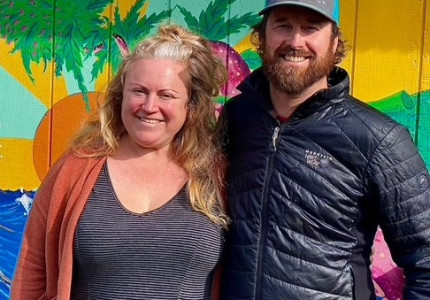Betty and Tim Stranske are as local as you can get. Betty was born in Willits. Tim moved to town in 1963.
“We grew up together,” Betty explains. “We went to the same elementary school. Tim was the meanest marble player in class. He always went home with all my favorite marbles,” she laughs.
“My brother dated a girl who lived next door to Tim, and we would visit as kids, but we eventually went our separate ways in high school.”
After Tim attended the United States Naval Academy, he lived in San Diego for a time and earned an MBA from San Diego State. He then returned to Mendocino County to work at Retech, while Betty stayed in Willits to raise her family.
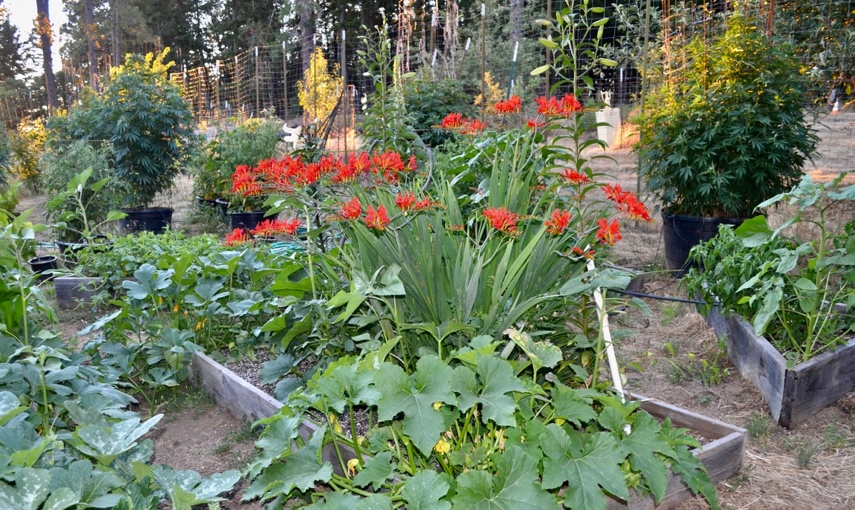 “Both our marriages fell apart at about the same time,” says Tim. “Betty and I had remained friends. I returned to town, we got together in 1995 and married in 2000,” he smiles. “We were so lucky because we got to marry as best friends,” Betty notes.
“Both our marriages fell apart at about the same time,” says Tim. “Betty and I had remained friends. I returned to town, we got together in 1995 and married in 2000,” he smiles. “We were so lucky because we got to marry as best friends,” Betty notes.
“When we got together, my children were older than Tim’s. Betty had 16, 17 and 18-year-olds and Tim had a 7-year-old and an 18-month-old,” says Betty.
“I had two kids and Betty had three. We were one shy of the Brady Bunch,” laughs Tim. “Our kids are super-close.”
 What could have been a devastating tragedy brought the family closer, when their 19-year-old son was seriously injured in a devastating motorcycle accident. “They gave him a 2% survival rate,” says Betty. His hospitalization and lengthy recovery upended the family for years as he required 24-hour care and extensive physical therapy. “But he beat the odds, and has a wonderful life,” Betty notes.
What could have been a devastating tragedy brought the family closer, when their 19-year-old son was seriously injured in a devastating motorcycle accident. “They gave him a 2% survival rate,” says Betty. His hospitalization and lengthy recovery upended the family for years as he required 24-hour care and extensive physical therapy. “But he beat the odds, and has a wonderful life,” Betty notes.
oday, Tim is a real estate appraiser and Betty has been in the mortgage business for over 30 years. Finding their perfect home enabled Tim to focus more on cannabis.
“We are avid campers and started looking for a place to get away since the early 2000’s,” says Tim. “Prices were skyrocketing. We looked for something in the 50–60-acre range for four years. We finally found a bigger property that was more money than we wanted to spend, but the real obstacle was it was landlocked with no easement. But when we walked the property, it was filled with spring grass and pepperwood trees- sure signs of lots of water. From my appraiser standpoint, it looked great.”
The property is surrounded on three sides by a unique organization- the Wente Boy Scout Camp. “We talked to the Scouts and expressed that we wanted to be good neighbors. We got the farm going and built a cabin. Three years later, they came down on us hard, but we were eventually able to work things out,” Tim smiles.
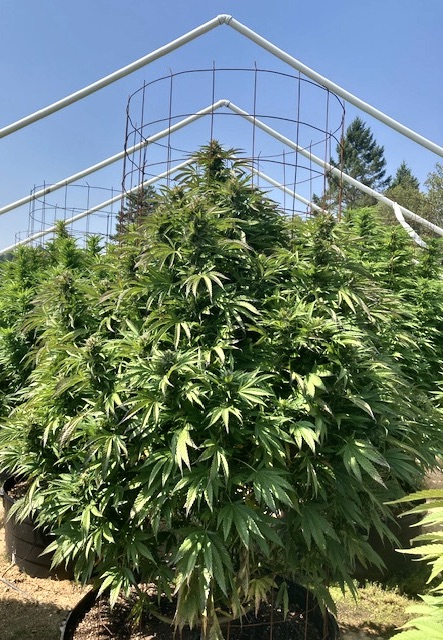 There was another reason relations smoothed over.
There was another reason relations smoothed over.
“I’m an Eagle Scout and still involved with the Scouts. We worked out the easement, agreeing we wouldn’t park on their land, wouldn’t speed, wouldn’t be a nuisance. They installed a beautiful, professional trail that meanders by our house. We walk our dogs on the trail every evening. We have a beautiful home now, and our relationship with our neighbor has been really great.”
Once Prop 215 passed, Tim and his cannabis partner got medical recommendations and began farming legally.
“We stumbled upon an old strain from the Willits-Ukiah area- a cross of Big Bud and Grape Ape. We grew that for several years. Then the market shifted, and it was all about names. Buyers would say, ‘If it isn’t Sour Diesel, we’re not interested.’ I began growing Chem Dog. I found it so hard to deal with- all those popcorn buds. Trimmers would look at us and say, ‘Oh no!’” Tim laughs.
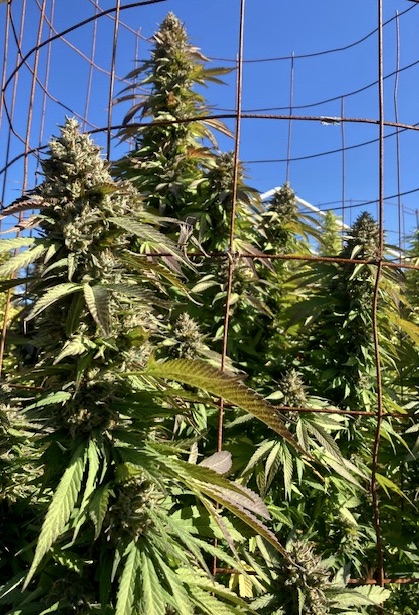 “We used to call the Grape Ape ‘Thumper,’ because you’d drop those heavy buds on the table and they’d make a loud, thumping sound,” he laughs.
“We used to call the Grape Ape ‘Thumper,’ because you’d drop those heavy buds on the table and they’d make a loud, thumping sound,” he laughs.
“I thought back on my big buds and big nugs and started playing with genetics. I crossed Sour Diesel and Chem Dog with Grape Ape. It’s been 25 years and we’re still going.”
Tim continues to create his own genetics with scores of original crosses, growing organically with no pesticides or herbicides. Tim has recently acquired what he believes is a landrace strain of 100% Indica.
“I look for a little smell of this or that, and think, ‘That could be great.’ For the Kure Mendocino Invitational, he created a cross of Super Lemon Haze and Grape Ape. “I decided to call it ‘Super Ape’ after Lee Scratch Perry. That was one of his nicknames. We lost him last year, so I wanted to pay tribute. It’s got a strong lemon nose. The first year I grew Lemon OG, I cut it down, strapped it on my quad and pulled into the shop. Everyone put down their scissors and asked, ‘What did you just bring in?’” he smiles. “We grew that for several years.” Now Tim is crossing Lemon OG with Super Ape. “It’s a double Lemon,” he grins. He’s calling it “Lemon Squared.”
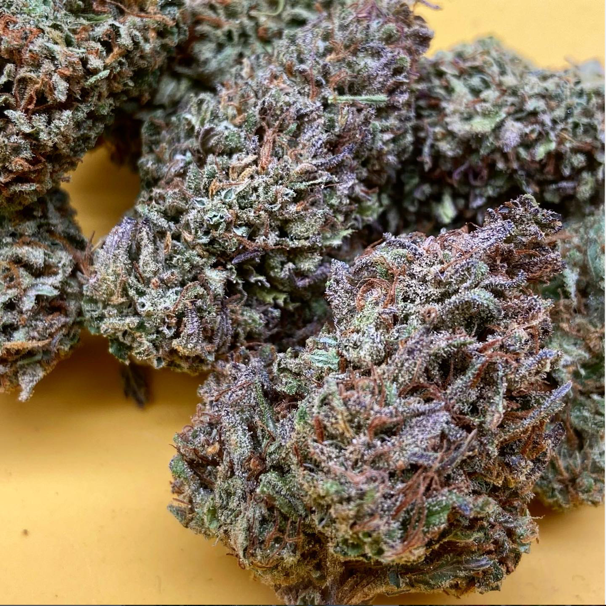 “I love playing with genetics. I can’t wait for the next cross. I make sure I have ½ dozen females and males. We put the boys next to the girls and let nature take its course.”
“I love playing with genetics. I can’t wait for the next cross. I make sure I have ½ dozen females and males. We put the boys next to the girls and let nature take its course.”
They are almost completed with licensing.
“We thought, we don’t have to run from helicopters anymore. The property is paid off, so I’ve got to get licensed. It would suck if they busted us and seized the ranch.”
“The portal is behind me. We have a state provisional license. We’ve completed our LSA work, and it’s been signed off. Everything is completed with the exception of CEQA. We hired a consultant who’s been in the business for 30 years, who is as frustrated as we are.”
Tim’s frustrations are based on two issues.
 “I had to write a bullfrog plan for our strictly ornamental pond, which is not attached to any stream. We have to write a backup generator plan for our solar. I cannot get the county to understand I do not need artificial lighting. I grow from seed. My seeds know what to do. Every day they know they’re getting three more minutes of light. So, I write a paper with much more detail than is necessary. I take it into the cannabis office and say, ‘I don’t want to offend you, but can you understand I don’t need artificial light?’”
“I had to write a bullfrog plan for our strictly ornamental pond, which is not attached to any stream. We have to write a backup generator plan for our solar. I cannot get the county to understand I do not need artificial lighting. I grow from seed. My seeds know what to do. Every day they know they’re getting three more minutes of light. So, I write a paper with much more detail than is necessary. I take it into the cannabis office and say, ‘I don’t want to offend you, but can you understand I don’t need artificial light?’”
Tim echoes the frustrations of every legal farmer in the county.
“I have a checklist from state agencies outlining everything required from cannabis farmers. I was told because grapes, pears and apples are already established crops, it’s ‘hard to impose new rules on them.’ They have lobbyists, they have money, but we’re a ‘new industry,’ so they implement these regulations on us- regulations they claim will ‘eventually’ be implemented on other branches of agriculture. Ask me if I believe that,” he laughs.
 “Everyone who knows the Triangle knows how easy it would be to turn this into an eco-tourism destination. I grew up in Willits. Everyone worked in the mills. We all recall seeing a logging truck hauling out one giant log. There was a time when our town prospered. All of our empty storefronts were filled. When Prop 64 was passed, it was supposed to take over where timber left off. But all you see is heartbreak,” says Betty.
“Everyone who knows the Triangle knows how easy it would be to turn this into an eco-tourism destination. I grew up in Willits. Everyone worked in the mills. We all recall seeing a logging truck hauling out one giant log. There was a time when our town prospered. All of our empty storefronts were filled. When Prop 64 was passed, it was supposed to take over where timber left off. But all you see is heartbreak,” says Betty.
“I’m a 5,000 square-foot grower, and I’m cutting back on production. I’ve got tubs stacked floor-to ceiling that I’m not going to move. This season, I’ll grow half of what I could legally grow. Big farms are crushing us- Santa Barbara and other counties where it’s just acres of greenhouses.”
Like the majority of their colleagues, the Stranskes believe that ultimately, quality will prevail over quantity. “We’ll spend more for a nice bottle of wine. And people will do the same with cannabis. I’m a legacy grower. I’m not leaving until I leave ‘toes-up,’ Tim smiles. “We can ride this out- if we can just re-educate the market.”
Stranske Farms entered Super Ape in the Kure Mendocino Invitational. Visit them on Facebook and Instagram.


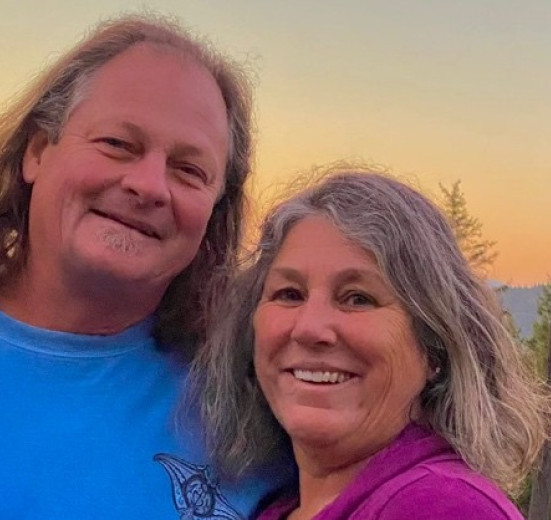

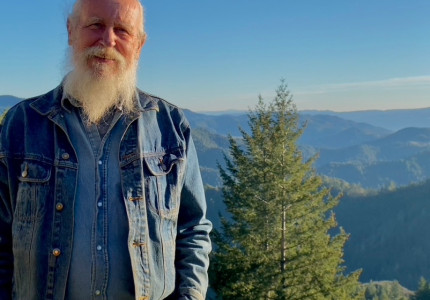
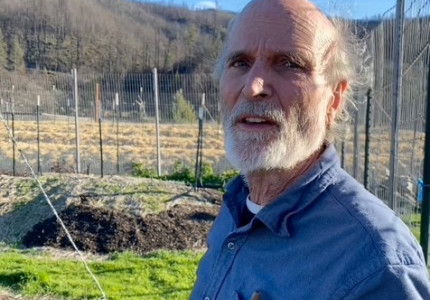
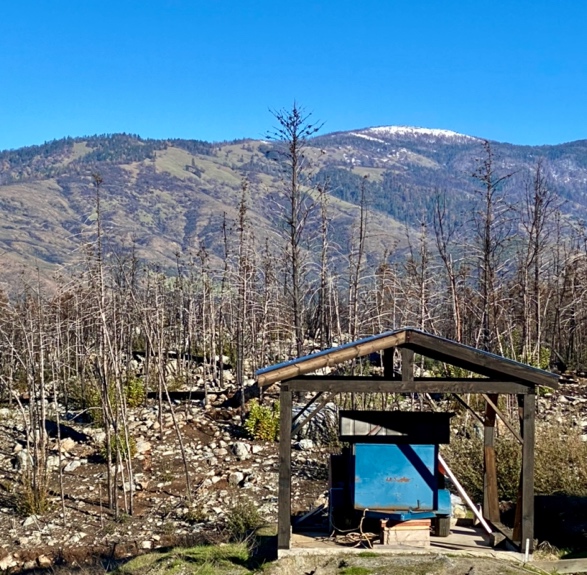 “I’ve only quit smoking three times since 1964,” he smiles.
“I’ve only quit smoking three times since 1964,” he smiles.